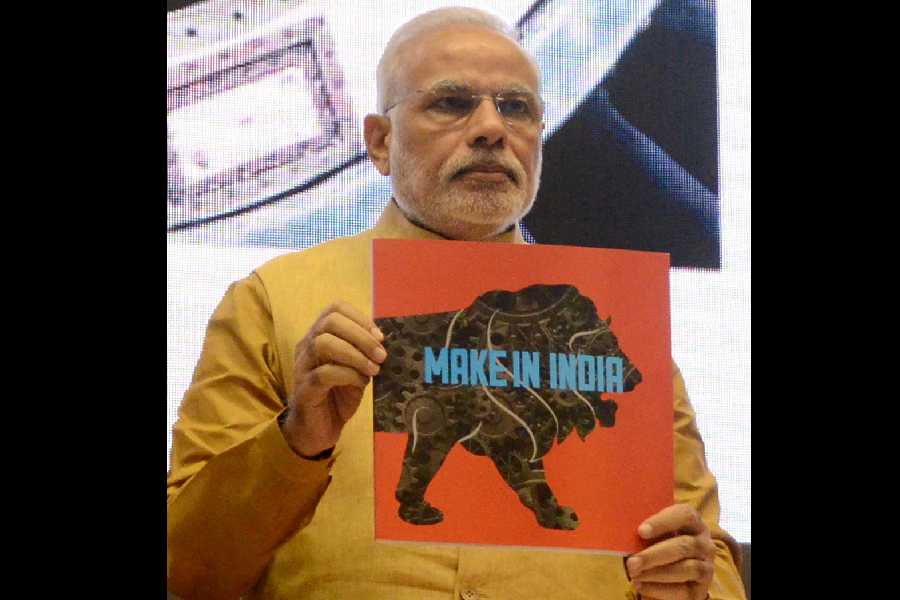An NCERT Class VII English language textbook wants students to spread awareness about the Centre’s schemes, prompting academics to call it a blatant attempt to use children as footsoldiers to push forward government propaganda.
The textbook, Poorvi, hails the government’s Digital India and Make In India initiatives. In the “About The Book” section, Kirti Kapur, academic coordinator, NCERT, has written that every chapter prescribes several activities, including “Let us listen” and “Let us explore”, which are about learning beyond the text.
“‘Let us explore’ extends learning beyond the text, staying within the unit’s theme. It aims to connect students with the Indian Knowledge System…,” Kapur writes.
The “Let us explore” section of the story “The Day The River Spoke” says: “The government has launched many schemes for the education of the girl child. Some of them are ‘Beti Bachao Beti Padhao’, ‘Balika Samridhi Yojana’, ‘Samagra Shiksha Scheme — Kasturba Gandhi Balika Vidyalayas’, etc. Find out more such schemes from the Internet or from your teacher and spread awareness in your neighbourhood.”
A transcript for a listening activity for the story “Three Days to See” presents a conversation between student Anuj and his mother. The mother says: “It’s great to know that your school has facilities to address the needs of the visually impaired. Thanks to the Digital India initiative, which is paving the way for the inclusion of the
visually impaired.”
For the story “Animals, Birds, and Dr Dolittle”, the “Let us explore” activity says: “Plan a visit with the teacher to a ‘goshala’ and find out how the cows are looked after.”
The “Let us explore” section of the story “The Tunnel” says: “The Nation’s pride Atal Tunnel is 9.02 kilometres long.”
The “Let us explore” section of the poem “Travel” praises the Make in India programme: “As an excellent example of ‘Make in India’ success story, the Indian Railways launched India’s first indigenous semi-high speed train, Vande Bharat Express. It has become a symbol of India’s aspirations for modern, efficient, and comfortable rail travel.”
The book also has two letters exchanged between two friends sharing their feelings about brave soldiers and the National War Memorial. One of the letters says: “It was envisioned and then inaugurated by India’s Prime Minister Shri Narendra Modi in February 2019.”
Anita Rampal, former dean of education at the University of Delhi and former chairperson of the NCERT’s primary textbook development committees, said a school textbook asking children to “create awareness” about government schemes was nothing but a government advertisement for its propaganda.
“The completely contrived conversation between the mother and the child about the Digital India initiative is blatant propaganda. No critical questions are asked. This is also problematic because it instrumentally uses a young child and her mother in an extremely awkward conversation to serve as propagandists for government programmes. A textbook and children cannot be used for such purposes,” Rampal said.
“We have used government posters, say on malaria, in NCERT environmental studies textbooks in the past. However, the aim was completely different. It was to promote the critical reading of texts and visuals that children see around them, including from official posters available in the public sphere. There’s a problem with the way the government uses the English textbook to sermonise and push ideas and refer to Sanskrit terms such as goshala (cow shelter) and other ancient medicinal practices,” Rampal said.
“On girls’ education, children may be asked to think about the issues they face and other girls face in accessing education. We do not enlist children as footsoldiers for government propaganda. The contents on the National War Memorial or the Vande Bharat Express are simply unengaging advertisement material which attempt to promote an uncritical notion of ‘patriotism’ not suitable for education or children’s textbooks,” Rampal said.
Many other books have similar propaganda material. For example, the English book for Class VI, Poorvi, released last year has content on the Ek Bharat, Shreshtha Bharat programme.
An academic said the NCERT must clarify the learning objectives behind including content on government schemes. “The book is more of an advertisement for the government. What are the pedagogy and learning objectives?” he asked.
An email has been sent to NCERT director Dinesh Prasad Saklani to understand his perspectives on the criticism of the Class VII book. His response is awaited.










